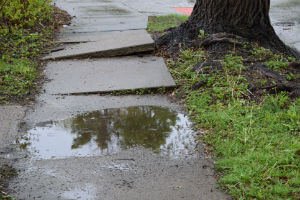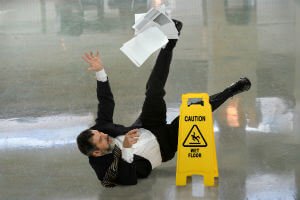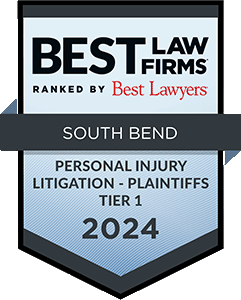 Have you suffered severe injuries in a slip and fall accident on someone else’s property?
Have you suffered severe injuries in a slip and fall accident on someone else’s property?
These accidents are common in the winter time in Indiana, as sidewalks, parking lots, roads and other areas where people walk are covered in ice or snow.
Victims often feel embarrassed and blame themselves for these accidents. They may believe they assumed the risk by going outside in adverse weather.
Those are common reasons why slip and fall victims decide not to pursue a premises liability claim against the property owner. This is unfortunate, because the property owner may be responsible for the accident under Indiana law, which means the victim could be entitled to compensation.
That is why victims should not make a decision about pursuing a legal claim until they meet with a knowledgeable South Bend premises liability lawyer.
The South Bend personal injury lawyers at Pfeifer, Morgan & Stesiak have detailed knowledge of Indiana premises liability laws and how they apply to snow, ice and other winter weather conditions.
Landlords and property owners must take reasonable action to clear natural snow and ice accumulations on walkways and other areas where visitors are expected to walk. Reasonable action includes inspecting the premises to uncover potentially dangerous conditions.
Winter premises liability law also states that property owners must provide sufficient warning to visitors about potential hazards.
Investigating Premises Liability Claims
If you decide to pursue a premises liability claim, our attorneys are prepared to do a thorough investigation to determine if negligence on the part of the property owner caused your injuries. We will have to determine:
- When did it begin snowing on the property?
- When did it stop snowing?
- When did temperatures go above freezing?
- How much thawing or melting of ice occurred before the accident?
- How much time did the property owner have to shovel or plow snow?
- Was there a clear path to parking spots?
- Were there downspouts or dripping overhangs near places where people were walking that caused unnatural accumulations of ice?
- Were there other slip and fall accidents on the property that the owner failed to investigate?
- Did the property owner inspect the premises before the accident?
- Did the landlord employ a third party to clear snow or ice from the area where your accident occurred?
Obtaining Compensation
During the investigation, the property owner or his or her insurance company may reach out to settle your claim. However, we will not accept any settlement offers for less compensation than you are entitled.
If necessary, we will take your claim to trial to pursue justice. In a jury trial, Indiana’s comparative fault rule, also known as the 51 percent rule, will apply. This means that the jury will assess the percentage of fault of all parties involved. If the jury finds that you are less than 51 percent at fault, you will be able to collect compensation.
However, the amount of compensation you receive will be reduced by your percentage of fault in the accident. For example, if the jury determines you were 20 percent at fault, and you are entitled to $10,000 in compensation, you will receive only $8,000.
Indiana’s Statute of Limitations
You have a limited amount of time to file a premises liability claim in Indiana. The statute of limitations sets a time limit of two years for personal injury claims, including those involving slip and fall accidents.
The clock on the statute of limitations starts ticking on the date of your accident. If you do not file a claim before the two-year deadline, you lose the right to have your case heard in court.
However, if you want to pursue a claim against a city, county or state government agency, you have even less time. Indiana law says claims against a city or county must be filed within 180 days. Claims against a state government agency must be filed within 270 days of an accident.
Our premises liability lawyers can evaluate your claim to determine exactly how much time you have to pursue a case. We also have the experience and legal knowledge to determine if it is worth your time to file a claim.
Call (574) 444-0741 and speak to a lawyer today.











